新人教版新目标初中英语九年级Unit10全单元课件
合集下载
1新目标九年级英语上Unit10 Section A 1a — 2d 教学课件 (共36张PPT)
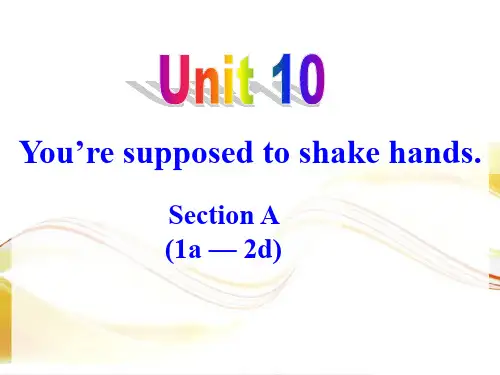
You’re supposed to shake hands.
Section A (1a — 2d)
Look at the map of the world. Please list the countries as many as possible and tell the others what people do when they meet for the first time in different countries. Work in pairs and discuss the question.
In China Shake hands
we are supposed to shake hands when we meet for the first time.
In Japan what do people usually do when they meet for the first time?
2d Finish the conversation with the correct words.
Katie: How was _t_h_e__w_e_l_c_o_m__e__p_a_r_ty____ for foreign students last night?
John: Great! I _m_a__d_e__ some new friends. But a _fu_n__n_y___ thing happened.
4.Maria should ask what she is supposed to _w_e_a_r_ if she is invited to a party next time.
2c Role-play a conversation between Maria
Section A (1a — 2d)
Look at the map of the world. Please list the countries as many as possible and tell the others what people do when they meet for the first time in different countries. Work in pairs and discuss the question.
In China Shake hands
we are supposed to shake hands when we meet for the first time.
In Japan what do people usually do when they meet for the first time?
2d Finish the conversation with the correct words.
Katie: How was _t_h_e__w_e_l_c_o_m__e__p_a_r_ty____ for foreign students last night?
John: Great! I _m_a__d_e__ some new friends. But a _fu_n__n_y___ thing happened.
4.Maria should ask what she is supposed to _w_e_a_r_ if she is invited to a party next time.
2c Role-play a conversation between Maria
人教版九年级英语unit10第十单元全单元课件
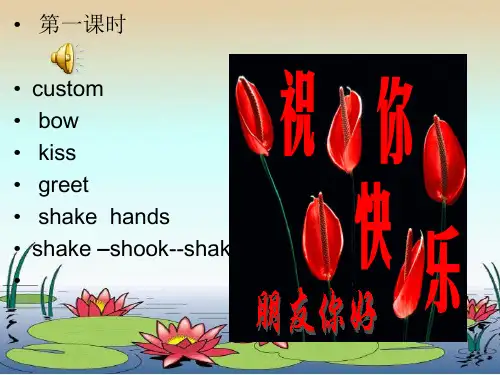
1. Maria was supposed to arrive at 7: 00, but she _a_r_r_iv_e_d__a_t_8_:_0.0
2. In Maria’s country, when you’re invited for 7:00, you’re expected to _c_om__e__la_t_e_r.
• good –better -- best
• 14 eat—ate –eaten 吃 hold—held—held举行
• make—made—made使 meet—met—met遇见
• find—found ---found发现wear-wore—worn穿着
• shake—shook –shaken 握 , 摇动
• 3 for the first time
第一次
• 4 be supposed to do sth 应该做某事=should do sth
• I am supposed to shake hands with him
• 5 be expected to do sth
被盼望去做某事
• 6 hold out hands
F relaxed about time.
T
In Switzerland, people never visit a friend’s house without calling first.
B.While- reading
3b Read the passage again and complete
Maria’s mistakes ____Ѵ____ arrived late ________ ate the wrong food ____Ѵ____ greeted Paul’s mother the wrong way ____Ѵ____ wore the wrong clothes
2. In Maria’s country, when you’re invited for 7:00, you’re expected to _c_om__e__la_t_e_r.
• good –better -- best
• 14 eat—ate –eaten 吃 hold—held—held举行
• make—made—made使 meet—met—met遇见
• find—found ---found发现wear-wore—worn穿着
• shake—shook –shaken 握 , 摇动
• 3 for the first time
第一次
• 4 be supposed to do sth 应该做某事=should do sth
• I am supposed to shake hands with him
• 5 be expected to do sth
被盼望去做某事
• 6 hold out hands
F relaxed about time.
T
In Switzerland, people never visit a friend’s house without calling first.
B.While- reading
3b Read the passage again and complete
Maria’s mistakes ____Ѵ____ arrived late ________ ate the wrong food ____Ѵ____ greeted Paul’s mother the wrong way ____Ѵ____ wore the wrong clothes
人教新目标九年级英语全册Unit 10课件
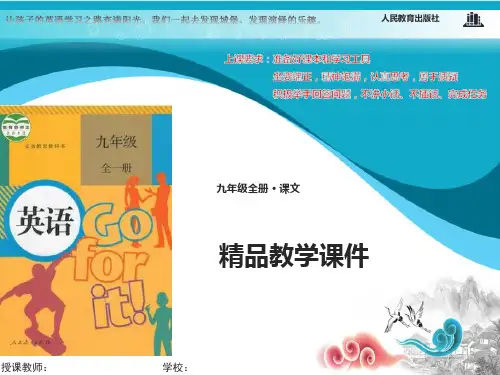
I met a Japanese boy called Sato, and as soon as I held out my hand, he bowed.
I didn’t know that. So I just stood there with my hand out. Finally, I returned the bow.
bow: When you bow to others, you should stand at attention and take off your hat to show your respect.
kiss: If you meet a friend or your relative, you can greet him or her with a hug or a kiss on the cheeks. If you are a couple, you can hug and kiss, but if you are parents and children, you just kiss on the face or forehead. If you are brothers or sisters, you just kiss on the cheeks.
Very funny. Later I found out French people are supposed to kiss when they see each other.
Countries France Japan Korea Brazil The United States Mexico China …
shake hands
Sometimes it’s not polite to shake hands.
新目标九年级Unit10单元整体课件
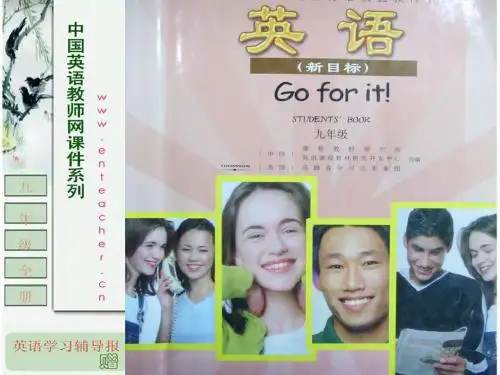
• (2)be late for 意为“……迟到”,for • 为介词,所以其后须跟名词。 • Don’t be late for the meeting. • 开会别迟到了。 • Tom has been late for classes twice. • 汤姆上课已经迟到两次了。
(3)close 在此为副词“接近地, 靠近
Reading (3a: P80)
The second story about April Fool’s
Day is the most believable. I have a similar experience. A few years ago, it was said there would be a big earthquake in our area. So people tried to buy as much food as possible
got home When I ________ (get home), I had left realized _______(realize) I ________(leave) my keys in the backpack. got By the time I ____ (get) back to had rung school, the bell _________ (ring). By the time I walked ______(walk) into class, the teacher__________ (start) had started teaching already.
Listening (2a, 2b: P79)
No name
Joe
Nick
Dave
新人教版九年级英语Unit10全单元课件
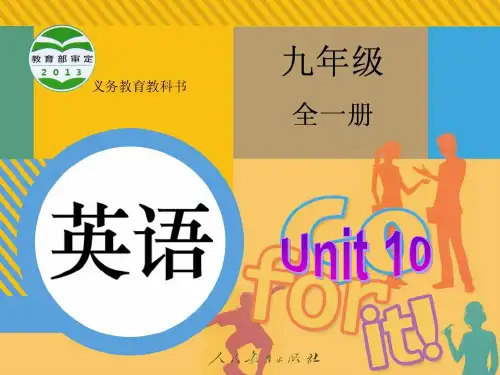
4. Maria should ask what she is supposed to _w__ea_r_ if she is invited to a party next time.
2c Role-play a conversation between
Maria and Dan. Use the information in 2a and 2b.
customs
1. __c___ Brazil
a. bow
2. __b___ the United States b. Shake hands
3. __a___ Japan
c. kiss
4. __b___ Mexico
5. __a___ Korea
1c Make conversations about what
bow: When you bow to others, you should stand at attention and take off your hat to show your respect.
kiss: If you meet a friend or your relative, you can greet him or her with a hug or a kiss on the cheeks. If you are a couple, you can hug and kiss, but if you are parents and children, you just kiss on the face or forehead. If you are brothers or sisters, you just kiss on the cheeks.
I remember when I first met Marie last year, I did the same thing. I held out my hand and to my surprise, she kissed me on both sides of my face!
初中英语 人教版新目标 九年级 Unit10 PPT课件
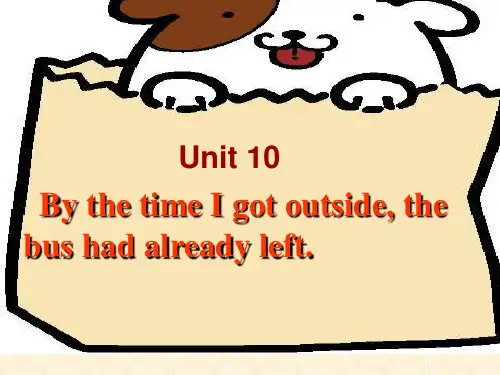
the bus __h_a_d__a_l_r_e_a_d_y__le_f_t_. So she had to__r_u_n__to__s_c_h_o_o_l_. Oh , dear !
When she got to school , she realized
she had left her backpack at home
本课出现的主要动词的过去式和过去分词
ring get go leave start be take run wake
rang got went left started was/were took ran woke
rung gotten gone left started been taken run woken
Task4: pair work
2c
Make up an ending for the story and share it with the rest of the class.
The teacher looked at Tina and……
Summary
过去完成时
1. 构成: had +V-p.p
我出去的时候,公共汽车已经开走了.
by the time 意思是 “到…的时候”, 相当于 when , 后接过去时的句子 时, 主语的谓语动词用过去完成时态, 即 had +P.P .
Tina’s morning
she overslept. oversleep overslept overslept
on for ten minutes.
三. Writing
Write about luo ming’s day. (见课本p81)
HOMEWORK
When she got to school , she realized
she had left her backpack at home
本课出现的主要动词的过去式和过去分词
ring get go leave start be take run wake
rang got went left started was/were took ran woke
rung gotten gone left started been taken run woken
Task4: pair work
2c
Make up an ending for the story and share it with the rest of the class.
The teacher looked at Tina and……
Summary
过去完成时
1. 构成: had +V-p.p
我出去的时候,公共汽车已经开走了.
by the time 意思是 “到…的时候”, 相当于 when , 后接过去时的句子 时, 主语的谓语动词用过去完成时态, 即 had +P.P .
Tina’s morning
she overslept. oversleep overslept overslept
on for ten minutes.
三. Writing
Write about luo ming’s day. (见课本p81)
HOMEWORK
人教新目标九年级英语全册课件《Unit 10 You’re supp
3a Read and answer.
1. What are the people in Colombia relaxed about ?
They’re relaxed about time.
2. Do they usually have to make plans to meet their friends in Colombia?
Different customs in different countries.
In Arab countries, men kiss one another on the cheek. Your host may welcome you with a kiss on both cheeks. It is polite of you to do the same. When a Japanese gives you a card, don't put it into your pocket right away. The person expects you to read it.
Yes, they do.
Read again and complete the chart.
Ideas and customs about being on time
visiting a friend’s house
making plans with friends
Colombia
it’s OK to be late
What do you know about Colombia?
Colombia is a country in South America. It has been the country which produces the best mild coffee in the world. Garcia Marquez, a famous writer, is from Colombia.
人教新目标九年级英语-Unit10 SectionA (3a-3c) 课件
1. Where I’m from①, we’re pretty relaxed② about time.在我来的地方,对于时间相当宽松。
①Where I’m from在我来的地方,where“在……的地 方”。
由 “where” 引导的地点状语从句。 Where he lives, there are many animals. Where there is a will, there is a way. ② be relaxed about 对某事随意,宽松,不加以拘束,不严格 I’m relaxed about what you wear to school.
2. 顺便访问 ___d_r_o_p__b_y_________
3. 计划做某事 m__a_k__e__p_l_a__n_s___to___do /plan to do 4. 尽可能多地 a__s__m__a__n_y__/_m__u__c_h...as one can 5. 准时 o__n__t_i_m___e_________ 6. 在正午 a__t__n_o__o_n_______ 7. 大动肝火_g__e__t_m___a_d________ 8. 竭尽全力做某事_m__a__k_e__a__n__e__f_fo__r_t to do ... 9. 没做某事_w___it_h__o__u_t__d_o__i_n__g___ 10. 没什么大不了的_I_t_'s___n_o___b_i_g__d__e__a_l_.
3b Read again and fill in the chart
Ideas and
Colombia
Switzerland
customs about...
Being on time ...be relaxed ...be very
人教新目标九年级全册Unit 10 SectionB(1a-1d)(共15张PPT).pptx
Unit10
SectionB(1a-1d)
Table manners in China stick your chopsticks into the food
You’re not supposed to stick your chopsticks into the food.
Table manners in China eat with hands
Have a safe trip! Yours,
Continue to finish the letter.
Mind your manners when you have meals in your daily life.
1. In India, you’re supposed to eat with your hands. T
2. In China, you’re not supposed to stick your chopsticks into
the food. T
3. In Korea, the youngest person is expected to start eating
Table manners in China
the older people start eating first
It is polite to let the older people start eating first at the table.
Table manners in China hit an empty bowl with the chopsticks
Dear Eric, I am very happy that you will come to China soon.
SectionB(1a-1d)
Table manners in China stick your chopsticks into the food
You’re not supposed to stick your chopsticks into the food.
Table manners in China eat with hands
Have a safe trip! Yours,
Continue to finish the letter.
Mind your manners when you have meals in your daily life.
1. In India, you’re supposed to eat with your hands. T
2. In China, you’re not supposed to stick your chopsticks into
the food. T
3. In Korea, the youngest person is expected to start eating
Table manners in China
the older people start eating first
It is polite to let the older people start eating first at the table.
Table manners in China hit an empty bowl with the chopsticks
Dear Eric, I am very happy that you will come to China soon.
人教新目标版九年级全一册Unit 10 Section A (3a — 3c)(共20张PPT)
It’s very important to be on time. IWt'seimnepvoelritevitsoitvaisfirt iaend’s fhroieunsde'swhiothuoseutwciathlloiuntg cfiarlslitn. g first. IWt'senuescueassllayrymtaokme apkleanpslatnos mtoemetefertiefrnidens.ds.
3c
Role-play a conversation. Student A is Teresa and Student B is Marc. Teresa is late and Marc is mad.
In …, you’re supposed /expected to…
A:Hi, Marc. Sorry, I’m a little late. B:Teresa, you’re 10 minutes late!
friend’s house oouurrfrfireiennddss' ’hhoommeess.often.
making plans with friends
WIt'se pdonlit’et hnaovtetotommaakkee plansswwhheennwweeggeriendss..
A:It’s just 10 minutes! It’s no big deal!
B:Well, in Switzerland, you’re supposed to…
When in Rome, do as the Romans do. 入乡随俗!
Write a short passage about manners in Colombia and Switzerland in 80 words.
3c
Role-play a conversation. Student A is Teresa and Student B is Marc. Teresa is late and Marc is mad.
In …, you’re supposed /expected to…
A:Hi, Marc. Sorry, I’m a little late. B:Teresa, you’re 10 minutes late!
friend’s house oouurrfrfireiennddss' ’hhoommeess.often.
making plans with friends
WIt'se pdonlit’et hnaovtetotommaakkee plansswwhheennwweeggeriendss..
A:It’s just 10 minutes! It’s no big deal!
B:Well, in Switzerland, you’re supposed to…
When in Rome, do as the Romans do. 入乡随俗!
Write a short passage about manners in Colombia and Switzerland in 80 words.
- 1、下载文档前请自行甄别文档内容的完整性,平台不提供额外的编辑、内容补充、找答案等附加服务。
- 2、"仅部分预览"的文档,不可在线预览部分如存在完整性等问题,可反馈申请退款(可完整预览的文档不适用该条件!)。
- 3、如文档侵犯您的权益,请联系客服反馈,我们会尽快为您处理(人工客服工作时间:9:00-18:30)。
Unit 10 You’re supposed to shake hands. Section A(1a—2d)
Ⅰ. 单词填写
1. custom(n. )
______________
2. bow(v. &n. )
______________
3. kiss(v. &n. )
______________
答案: D。在朝鲜, 当第一次见面的时候, 人们应该鞠躬。
1. be supposed to应该…… 【语境领悟】 *You are supposed to shake hands. 你们应该握手。 *You are not supposed to smoke here, sir. 先生, 你不应该在这儿吸烟。
*I expect to get a birthday present from my dad. 我期待着收到一件来自父亲的生日礼物。 *Do you expect him to teach you English? 你希望他教你英语吗? *I didn’t expect that you would get there so soon. 我没想到你会这么快就到达那里了。
【学以致用】 (2013·青岛中考)—You look sad. What has happened? —Everyone ______us to win the match, but we lost. A. expects B. expected C. hopes D. hoped
Ⅰ. 用所给词的适当形式填空 1. Social__________ (custom)are different from country to country. 2. —Hello, Bill. Did you go to Ann’s birthday party? —No, I wasn’t__________ (invite)at all. 3. You are__________ (suppose)to bow when you meet someone for the first time in Korea. 答案: 1. customs 2. invited 3. supposed
【学以致用】
(2013·菏泽中考)You are ______to type quickly when talking to
each other on QQ, so the other person doesn’t get bored.
A. suggested
B. supported
C. taught
D. supposed
2. expect v. 预料; 盼望 【语境领悟】 *In the United States, they’re expected to shake hands. 在美国, 他们将握手。 *The old man is expecting his daughter’s visit. 这个老人正盼望着他女儿的到访。
2. In______, people are supposed to bow when they meet for
the first time.
A. China
B. Mexico
C. the United States D. Korea
_________________________________________________
when we meet for the first time.
A. bow
B. shake hands
C. kiss
D. bow and shake hands
_________________________________________________
答案: B。在中国, 当第一次见面的时候, 我们应该握手。
【自主归纳】 expect是及物动词, 意为“预料, 盼望”, 它有以下常见用法: (1)expect+n. /pron. 预计……可能发生; 期待某人或某物 (2)expect+to do sth. 料想做某事 (3)expect sb. to do sth. 期望某人做某事 (4)expect +从句 预计/料想……
3. 这就是日本人期望相互问候的方式。 That’s__________ people in Japan__________ __________ __________ greet each other. 答案: how; are expected to
1. In China, we’re supposed to______
Ⅲ. 句型填词 1. 你们应该握手。 You__________ __________ __________ shake hands. 2. 玛丽亚应该7点钟到, 但她是8点钟到的。 Maria__________ __________ __________ __________ at 7: 00, but she arrived at 8: 00. 答案: 1. are supposed to 2. was supposed to arrive
4. greet(v. )Leabharlann ______________
答案: 1. 风俗 2. 鞠躬 3. 亲吻 4. 和……打招呼
Ⅱ. 短语连线 1. 握手 2. 期望做某事 3. 第一次 4. 应该做某事
A. for the first time B. be supposed to do sth. C. expect to do sth. D. shake hands
【自主归纳】 (1)be supposed to意为“被期望或被要求……”, 表示劝告、建 议、义务等; 其中to为动词不定式符号, 后接__________ (动词 原形/v. -ing)。 (2)be supposed to do sth. 相当于should do sth. , 意为“应该做 某事”。 (3)be not supposed to do sth. 相当于shouldn’t do sth. , 意为 “不应该/不能做某事”, 表示命令和禁止。 答案: 动词原形
Ⅰ. 单词填写
1. custom(n. )
______________
2. bow(v. &n. )
______________
3. kiss(v. &n. )
______________
答案: D。在朝鲜, 当第一次见面的时候, 人们应该鞠躬。
1. be supposed to应该…… 【语境领悟】 *You are supposed to shake hands. 你们应该握手。 *You are not supposed to smoke here, sir. 先生, 你不应该在这儿吸烟。
*I expect to get a birthday present from my dad. 我期待着收到一件来自父亲的生日礼物。 *Do you expect him to teach you English? 你希望他教你英语吗? *I didn’t expect that you would get there so soon. 我没想到你会这么快就到达那里了。
【学以致用】 (2013·青岛中考)—You look sad. What has happened? —Everyone ______us to win the match, but we lost. A. expects B. expected C. hopes D. hoped
Ⅰ. 用所给词的适当形式填空 1. Social__________ (custom)are different from country to country. 2. —Hello, Bill. Did you go to Ann’s birthday party? —No, I wasn’t__________ (invite)at all. 3. You are__________ (suppose)to bow when you meet someone for the first time in Korea. 答案: 1. customs 2. invited 3. supposed
【学以致用】
(2013·菏泽中考)You are ______to type quickly when talking to
each other on QQ, so the other person doesn’t get bored.
A. suggested
B. supported
C. taught
D. supposed
2. expect v. 预料; 盼望 【语境领悟】 *In the United States, they’re expected to shake hands. 在美国, 他们将握手。 *The old man is expecting his daughter’s visit. 这个老人正盼望着他女儿的到访。
2. In______, people are supposed to bow when they meet for
the first time.
A. China
B. Mexico
C. the United States D. Korea
_________________________________________________
when we meet for the first time.
A. bow
B. shake hands
C. kiss
D. bow and shake hands
_________________________________________________
答案: B。在中国, 当第一次见面的时候, 我们应该握手。
【自主归纳】 expect是及物动词, 意为“预料, 盼望”, 它有以下常见用法: (1)expect+n. /pron. 预计……可能发生; 期待某人或某物 (2)expect+to do sth. 料想做某事 (3)expect sb. to do sth. 期望某人做某事 (4)expect +从句 预计/料想……
3. 这就是日本人期望相互问候的方式。 That’s__________ people in Japan__________ __________ __________ greet each other. 答案: how; are expected to
1. In China, we’re supposed to______
Ⅲ. 句型填词 1. 你们应该握手。 You__________ __________ __________ shake hands. 2. 玛丽亚应该7点钟到, 但她是8点钟到的。 Maria__________ __________ __________ __________ at 7: 00, but she arrived at 8: 00. 答案: 1. are supposed to 2. was supposed to arrive
4. greet(v. )Leabharlann ______________
答案: 1. 风俗 2. 鞠躬 3. 亲吻 4. 和……打招呼
Ⅱ. 短语连线 1. 握手 2. 期望做某事 3. 第一次 4. 应该做某事
A. for the first time B. be supposed to do sth. C. expect to do sth. D. shake hands
【自主归纳】 (1)be supposed to意为“被期望或被要求……”, 表示劝告、建 议、义务等; 其中to为动词不定式符号, 后接__________ (动词 原形/v. -ing)。 (2)be supposed to do sth. 相当于should do sth. , 意为“应该做 某事”。 (3)be not supposed to do sth. 相当于shouldn’t do sth. , 意为 “不应该/不能做某事”, 表示命令和禁止。 答案: 动词原形
